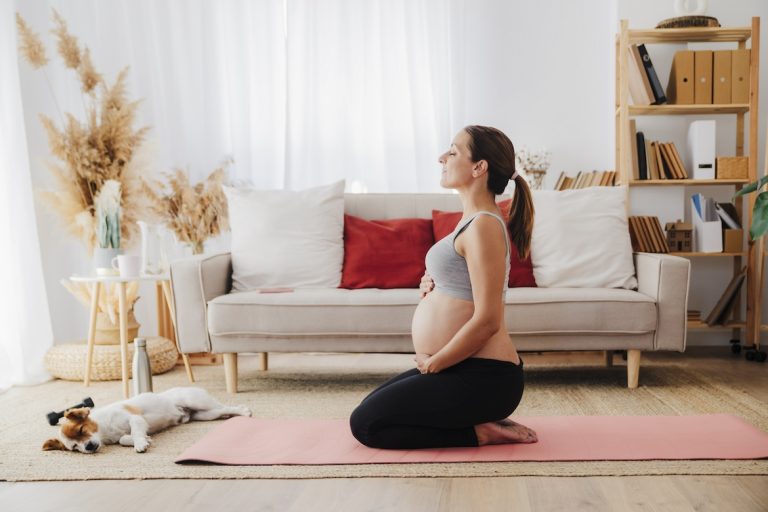
[ad_1]
Pregnancy means experiencing constant physiological changes—not only from week to week, but even day to day. While there may certainly be excitement, there are also a lot of unknowns that can make these transitions tough.
If you practiced yoga before pregnancy, learning how to modify poses enables you to stay active and continue practicing, which can help you feel a little bit more like yourself. But if you’re brand new to yoga, then this is the perfect time to start.
“Yoga is a low-impact and full-body practice that can be very supportive in pregnancy,” says Jenn Gelfand, DPT, E-RYT, a physical therapist, yoga teacher, and owner of Root to Rise Physical Therapy, which specializes in pelvic floor health, prenatal, and postnatal care. “Tuning into our physical and emotional body is so important during this time, and it can help reduce stress and anxiety.”
Because there are so many yoga poses you can choose to modify, we wanted to start with the basics: sun salutation A (Surya Namaskar A). This mini sequence is commonly taught as a warm-up in most modern yoga classes.
So, to help you feel confident and comfortable on the mat, we’ll break down the best way to practice this popular full-body yoga warm-up that’s safe for both you and your baby in every trimester.
How to modify sun salutation A during pregnancy
A full round of a sun salutation includes flowing through the following postures: mountain pose, forward fold, halfway lift, high plank, low plank, upward-facing dog, and downward-facing dog.
Depending on your level of physical ability and what trimester you’re in, some of these poses need to be modified or skipped entirely, while others are safe to do no matter how far along you are.
Here are the most important modifications to make while practicing sun salutations during pregnancy.
1. Mountain pose (Tadasana)
Stand at the top of your mat with feet hip-width apart or even wider if you’re in your late second or third trimester. This will provide more support and better balance as your belly grows and shifts your center of gravity.
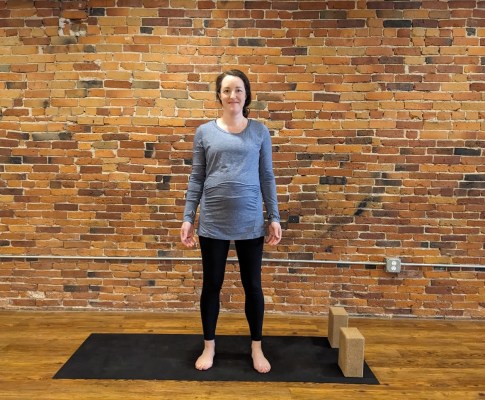
- Stand tall with your feet hip-width apart (or wider, depending on what’s comfortable for you), arms relaxed by your sides, and palms facing forward.
- Roll your shoulders back and down, opening your chest.
- Lengthen your spine by reaching the crown of your head toward the ceiling without straining.
- Take a few deep breaths here, grounding down through all 10 toes and the heels of your feet.
2. Forward fold (Uttanasana)
Maintain a wide stance for plenty of stability and space for your belly as you fold forward. Placing a yoga block underneath each hand to raise the floor up to you can take strain off your core and spinal muscles and provide support.
If you feel unbalanced or lightheaded while moving from mountain pose to forward fold, modify with a high squat position by pausing halfway, bending your knees and resting your elbows on your thighs for one cycle of breath. When you feel ready, move into the next posture.
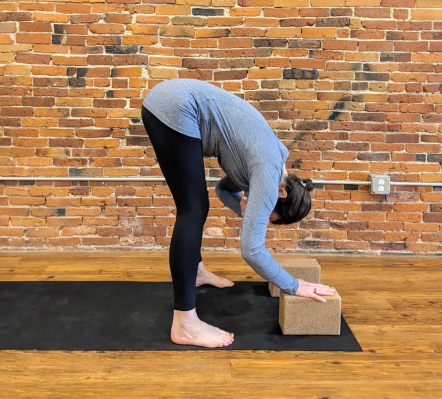
- Place a yoga block about 6 to 12 inches in front of each foot.
- Stand tall with your feet hip-width apart (or wider, depending on what’s comfortable for you), arms relaxed by your sides, and palms facing forward.
- Exhale as you hinge forward at your hips, bending from your waist and folding your torso over your thighs. Bend your knees slightly.
- Place one palm on each of the yoga blocks in front of you.
- Feel the stretch along the backs of your legs and spine as you surrender into the pose.
3. Halfway lift (Ardha Uttanasana)
Just like forward fold above, a wide stance in this pose will provide stability and space for your belly. Keep the yoga blocks underneath each hand to raise the floor up to you and make the pose easier.
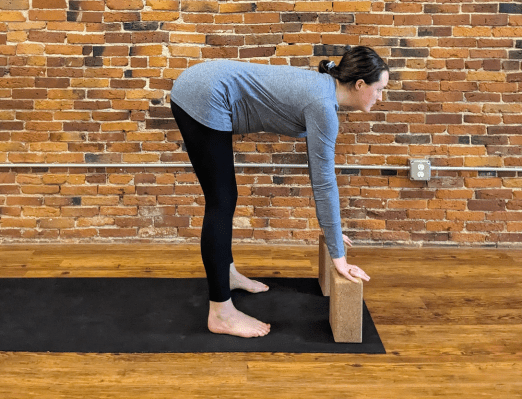
- From forward fold (above), inhale and press your palms or fingertips into the yoga blocks and lift your torso halfway up.
- Lengthen your spine forward, reaching your crown away from your tailbone and creating a straight line from your head to your tailbone. Keep your spine long and flat, engaging your core to support your lower back.
- Keep your gaze slightly forward to maintain a neutral neck.
4. High plank (Phalakasana) to low plank (Chaturanga Dandasana)
“Recommendations vary greatly depending on how stable your abdominal wall is,” Gelfand says. “If there’s excessive pressure or abdominal strain, bringing your knees to the floor can be a great variation.”
Additionally, if you’re dealing with sore wrists or carpal tunnel syndrome, place a folded blanket or wedge yoga blocks beneath your palms to ease the pressure.
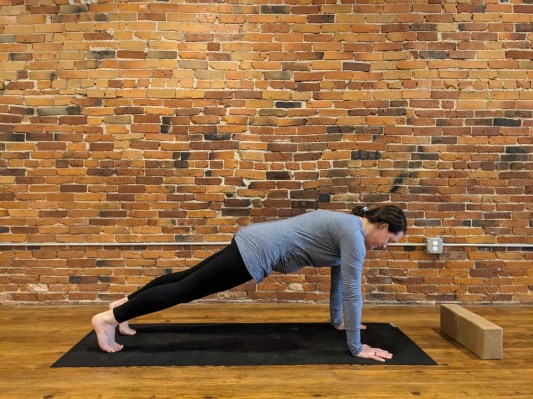
- Begin at the top of a push-up position with your hands beneath your shoulders and your body in a straight line from your head to your heels.
- Engage your core to keep your hips in line with the rest of your body. Keep your gaze slightly forward to maintain a neutral neck.
- On an exhale, lower your body toward the ground by bending your elbows directly back alongside your ribcage. If this isn’t available to you, lower your knees to the floor in tabletop position instead.
5. Upward-facing dog (Urdhva Mukha Svanasana)
Because it’s important to avoid compressing your belly during pregnancy, upward-facing dog (and even cobra pose) is off limits. Instead, try lowering to your hands and knees and arching your spine in cow pose for a safe and gentle backbend.
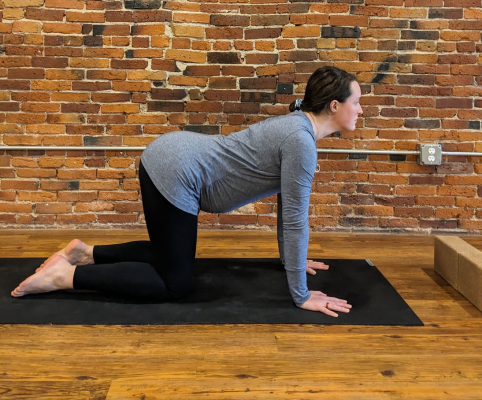
- Start on your hands and knees in a tabletop position. Your wrists should be directly under your shoulders and your knees should be directly under your hips. Keep your gaze slightly forward to maintain a neutral neck.
- Lift your chin and chest while looking toward the ceiling and drop your belly toward the floor. If it’s comfortable to do so, drop your belly fully to create a deep curve in your spine. Move slower or more gently if a full curve would be uncomfortable, which may be the case during late pregnancy.
- Take a few deep breaths here and hold.
For a more invigorating chest opener and modification for upward-facing dog, try hero pose (Virasana). For this pose, Gelfand advises listening to your body to use your best judgment.
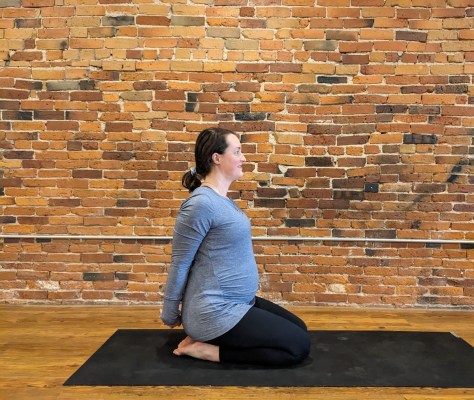
- Kneel on your knees, then back on your heels.
- Interlace your fingers behind your back and stretch your chest open.
- Take a few deep breaths here and hold.
6. Downward-facing dog (Adho Mukha Svanasana)
Downward-facing dog is safe to do throughout every trimester, and it offers a dynamic stretch for the entire body. That being said, modifications can be useful depending on how you’re feeling and what phase of pregnancy you’re in.
As your belly grows, widen your stance enough so there’s plenty of space for baby, and use padding or wedge yoga blocks underneath your hands if your wrists feel sore.
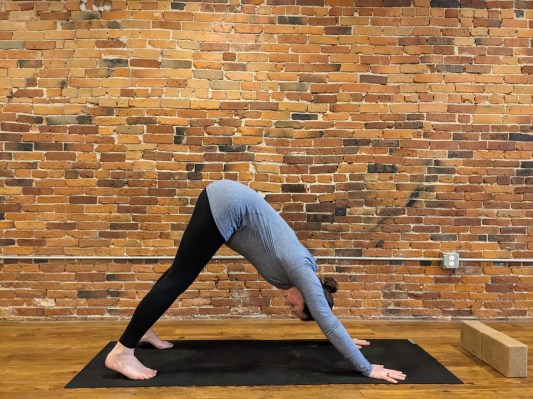
- Begin on your hands and knees in a tabletop position, with your wrists under your shoulders and your knees under your hips.
- On an exhale, tuck your toes under and lift your hips up toward the ceiling, straightening your arms and legs.
- Press down through your palms and fingertips as you lift your hips high. Your body should form an inverted “V” position.
- Engage your quadriceps (front of the thigh) to lift your kneecaps and lengthen through your legs.
- Allow your heels to sink toward the floor, but don’t worry if they don’t touch—focus on creating length in your spine and legs.
- Keep a slight bend in your knees if you feel any strain in your hamstrings or lower back.
There may come a time in your pregnancy where it’s more comfortable to lower your knees to the mat and practice tabletop pose (Bharmanasana) on all fours.
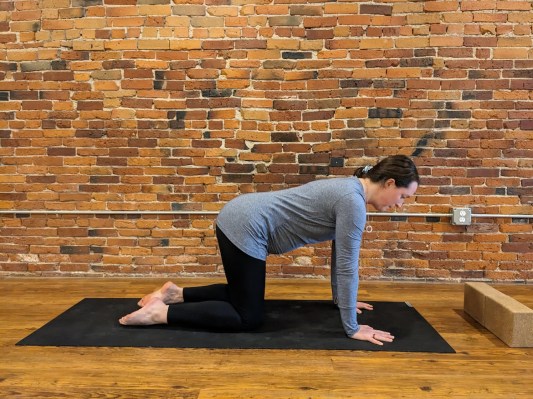
- Begin on your hands and knees, with your wrists under your shoulders and your knees under your hips.
- Press your palms into the floor.
- Take a few deep breaths here and hold.
How to modify transitions in sun salutations
If your belly has grown far too large to make stepping your foot to the top of your mat from downward-facing dog almost impossible, lower your knees and step forward (recruiting blocks if you need extra space!) for a smooth and easy transition. The same goes for stepping back to plank pose from forward fold.
“Taking wide, slower steps to the top of the mat with intentional breathing can be more gentle versus jumping forward,” Gelfand says. “This can help decrease pressure on the pelvic floor if that is of concern.”
“Sun salutations have so many opportunities to meet you where you are, as long as you’re moving with intention and modifying as needed.” —Jenn Gelfand, DPT, E-RYT
The benefits of doing sun salutations during pregnancy
By design, this short sequence of poses warms up your whole body and also cultivates a full, free-flowing breath.
“Because sun salutations are traditionally practiced with a movement and breath connection, it’s a wonderful way to move energy and connect to breath in pregnancy,” Gelfand says.
Supporting blood flow and encouraging oxygenation throughout your body is essential to a healthy baby and parent. But Gelfand says breathing well is also an important, albeit unexpected, component of deep core strength throughout pregnancy.
“Physically tuning into the breath connects us to our deep core and helps improve mobility and function of the abdominal wall, pelvic floor, and diaphragm,” she says.
As your baby grows and your uterus expands, there’s less room for your diaphragm (your body’s key respiratory muscle) and more pressure on your lungs, so breathing can be more difficult.
According to Gelfand, it’s also very common for your pelvic floor muscles to tighten, and they rely even more on other muscles, like your chest muscles, to take deep breaths. Practicing a well-paced sun salutation can be helpful to establish a full, healthy breathing pattern that supports your entire body, and “when performed with intention, can promote deep core, hip, and lower- body strength.”
Safety tips and precautions
Luckily, when making these modifications, sun salutations are “generally safe during pregnancy” Gelfand says. “Sun salutations have so many opportunities to meet you where you are, as long as you’re moving with intention and modifying as needed.”
It’s even more true during pregnancy that listening to your body and paying attention to sensations while practicing yoga is crucial for a safe and fulfilling experience on the mat.
While honing your awareness and intuition is key, Gelfand advises people who are pregnant to avoid doing their deepest stretch because there’s “more laxity in the ligaments and connective tissues that allow us to go deeper into poses than we otherwise would, but that isn’t always the best thing for our muscles and joints.”
To counteract this extreme flexibility and stay fully engaged, her best tip is “to exhale the breath prior to and throughout transitions [from pose to pose]. This manages pressure along the abdominal wall and pelvic floor, and naturally engages the deep core during times when we need the extra support.”
No matter how often you practice sun salutations in yoga while pregnant, always remember to give yourself as much extra support as you feel like you need for a happy and healthy pregnancy that will help you prepare for your—and your baby’s—next phase of life.
[ad_2]
Source link